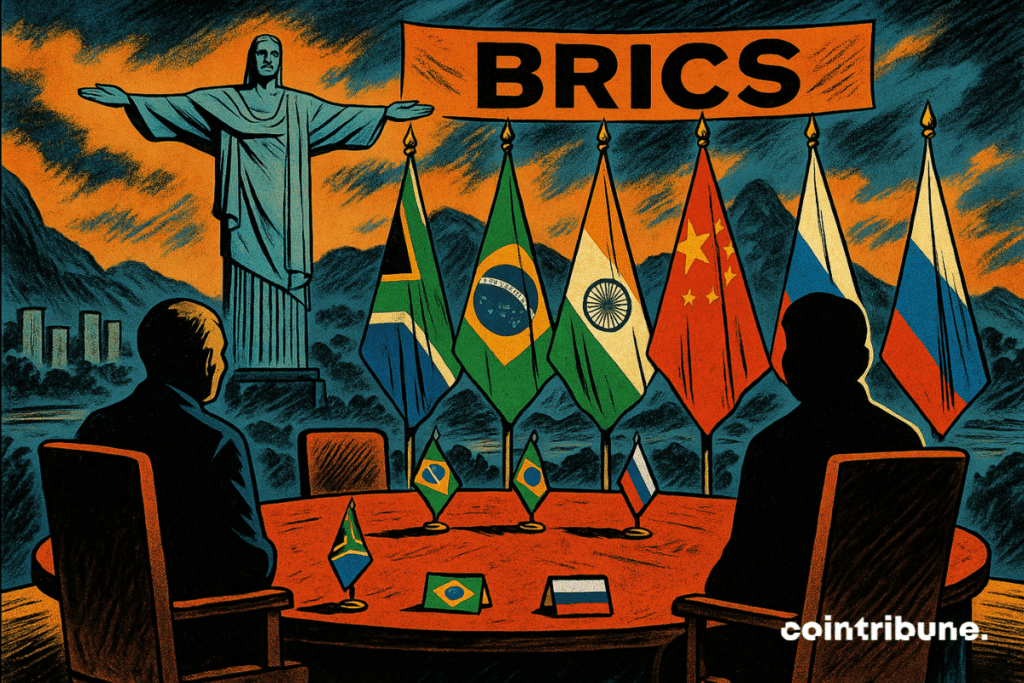Xi & Putin Skip BRICS Summit in Rio – Geopolitical Snub or Strategic Play?
Two of the world's most powerful leaders ghost their own economic alliance meeting. What happens when the BRICS architects don't show up to their own party?
The no-shows raise eyebrows
No official reasons given, but analysts smell deliberate maneuvering. The empty chairs speak louder than any press release—especially with fresh Western sanctions looming over Moscow and Beijing's 'de-dollarization' push stalling harder than a memecoin in a bear market.
All eyes on the replacements
With heavyweight players absent, second-string delegations scramble to salvage the agenda. Expect lots of photo ops, zero actionable policies, and enough diplomatic platitudes to make a central banker blush.
Bottom line: When the cats are away, the mice will... pretend nothing's wrong while quietly updating their LinkedIn profiles.

In brief
- Xi Jinping will not attend the BRICS summit in Rio, a first since he took office in 2013.
- Beijing cites a scheduling conflict, but a state dinner offered to Modi by Lula could be the source of the discomfort.
- Vladimir Putin, meanwhile, is absent due to the International Criminal Court’s arrest warrant.
- The 2025 BRICS summit will therefore take place without its two dominant figures, symbolically weakening the event.
Withdrawal of key figures: Xi and Putin absent in Rio
While the BRICS were hoping to accelerate dedollarization after this year’s summit, Xi Jinping will not attend the meeting on July 6 and 7, 2025 in Rio de Janeiro. This marks a significant diplomatic turning point, as the Chinese president has never missed a group meeting since 2013, including the VIRTUAL editions during the pandemic.
Beijing officially cited a “scheduling conflict”, but several diplomats mention irritation related to the Brazilian invitation extended to Narendra Modi for a state dinner, perceived as a slight against China. In this context, it is Prime Minister Li Qiang who will represent Beijing in Rio, as was already the case at the 2023 G20 in India.
Russia, for its part, confirmed Vladimir Putin’s absence, hindered by the arrest warrant issued by the International Criminal Court (ICC). Although the Kremlin had long cast doubt, his absence is no longer debated. These two withdrawals, for different but symbolically heavy reasons, profoundly change the balance of the summit. Here are the main facts to remember:
- Xi Jinping will be replaced by Li Qiang, a lower-ranking delegation, despite the strategic importance of the summit;
- Brazil, the host country, was hoping for his attendance after two bilateral meetings between Lula and Xi in less than a year (G20 2024, China-CELAC forum 2025);
- The state dinner in honor of Modi could be the root of Chinese discomfort, suggesting tension between Beijing and New Delhi;
- Putin, for his part, is absent for legal reasons: Brazil being a signatory of the Rome Statute, he risked legal arrest on its soil;
- These absences de facto reduce the symbolic and political impact of the summit, just as the BRICS strive to extend their influence.
The coordinated, although unconcerted, withdrawal of China and Russia from this central diplomatic event calls into question the BRICS’ ability to show strategic unity in an increasingly fragmented geopolitical context.
An economic and monetary dynamic put on hold
The joint absence of Xi Jinping and Vladimir Putin goes beyond a matter of diplomatic protocol. It is likely to have direct consequences on the economic and financial ambitions of the BRICS, especially regarding the strategic project of a common currency cited as a lever for dedollarization.
This project, often highlighted in official speeches from Moscow and Beijing, aimed to create a credible alternative to the monetary system dominated by the US dollar. However, without the active participation of the two main drivers of this initiative, it seems unlikely that concrete advances will be announced at the Rio summit.
Chinese spokesperson Guo Jiakun emphasizes that “in a volatile and troubled world, the BRICS nations maintain their strategic will and work together for peace, stability, and global development”.
However, this reassuring rhetoric masks a more uncertain reality. The group’s internal divergences, exacerbated by rivalries between China and India, hinder collective decisions.
Brazil’s disappointment over Xi’s withdrawal could also weaken the diplomatic momentum of the Brazilian presidency, even though Lula hoped to make this year’s summit a showcase for strengthened South-South cooperation. As for the newly integrated or invited countries (Iran, Egypt, Ethiopia…), their influence remains limited in arbitrating major orientations.
In the medium term, this weakened configuration could delay some of the bloc’s structuring initiatives, including discussions on a possible BRICS stablecoin or a sovereign blockchain, topics closely followed in the crypto sphere.
While none of these projects is officially suspended, their credibility largely depends on the political will of the heavyweight countries of China and Russia. Their partial withdrawal from the Rio summit casts a shadow of uncertainty over the group’s technological agenda, which is otherwise portrayed as an alternative to Western standards in digital finance.
Ultimately, the Rio summit, stripped of two of its major protagonists, risks being a missed opportunity. It will likely offer a showcase of institutional continuity but without the hoped-for structuring decisions. In the long run, this sequence could prompt the BRICS to rethink their governance and coordination methods, at the risk of losing credibility with markets and actors like RON Paul who saw in them a real alternative to the Western economic system.
Maximize your Cointribune experience with our "Read to Earn" program! For every article you read, earn points and access exclusive rewards. Sign up now and start earning benefits.

